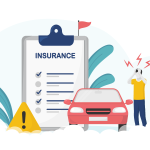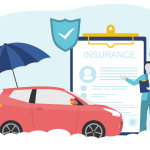Rideshare Drivers: Are You Insured Enough?
June 3, 2024

In the fast-paced world of ridesharing and delivery services, where convenience and opportunity collide, every trip packs a punch you might not expect. With platforms like Uber and Lyft reshaping transportation and dining experiences, a new breed of workers has emerged: the gig workers. These drivers seize the chance to earn income on their own terms, whether it’s delivering packages or chauffeuring passengers through the city streets.

While you might be making the most of your leisure time by earning a bit of extra income, the reality behind the wheel is a delicate dance of risks and liabilities. From skillfully avoiding fender benders to gracefully handling the occasional spilled coffee, every moment on the road presents its own set of challenges.
But amidst the convenience and excitement, there’s a crucial aspect that both drivers and passengers shouldn’t overlook: insurance coverage. While we admire your go-getter attitude, let’s not brush aside the realities of potential accidents and property damages.
But why is insurance coverage so important for gig drivers?
You might think that transportation network companies (TNCs) as large as Uber and DoorDash will have your back with comprehensive insurance coverage. And while they do provide some level of protection, it often falls short of covering all the bases. Your TNC insurance might cover some things, like fixing your car after a crash, but if someone swipes a package you’re delivering, you could be left footing the bill unless you have the right insurance. And when it comes to passengers, things get tricky. TNC insurance usually kicks in when you’ve got someone on board, but if trouble strikes before they hop in, you might be on your own. It’s like driving with blind spots—it’s crucial to know where they are for safety.
Plus, as the gig economy experiences a surge in accidents and claims, TNCs are tightening their grip on insurance coverage to mitigate risks and combat fraud. This means gig drivers are faced with navigating a maze of insurance policies, terms, and conditions.
Factors like your location, the time of the accident, and your existing insurance can all influence the level of coverage provided. This variability leaves you vulnerable to significant financial risks in the event of accidents, injuries, or property damage. It’s a complex landscape where seeking professional advice becomes essential to truly understand the extent of your coverage available.
So what kind of insurance do gig workers actually need?
There’s a variety of factors at play here. Your existing auto policy matters, as does the level of coverage provided by the TNC you’re working for. While some companies offer more robust insurance packages, it’s vital to grasp their limitations. That’s where additional coverage, like specialized rideshare insurance, can come in handy, filling any gaps in protection.
Adding to the complexity, some TNCs are suggesting that certain claims should fall under a driver’s personal auto insurance. For example, if your TNC’s insurance only covers accidents while driving passengers but not while waiting for a ride request, your personal auto insurance should ideally step in to bridge that gap.
Unfortunately, only a handful of insurers are comfortable extending coverage to food delivery/rideshare services, leading to skyrocketing premiums on your personal auto insurance. It’s a tangled web, but ensuring you have the right coverage with the right insurer is crucial for protecting yourself from unexpected financial burdens.
RELATED: Collision vs. Comprehensive Insurance: What’s the Difference?
How can we help you?
In the face of these challenges, drivers must take proactive steps to assess their insurance needs. This involves:
1. Understanding TNC Coverage: It’s essential to inquire about the level of coverage provided by the TNC you work for and thoroughly review the terms and conditions outlined in the insurance contracts.
2. Evaluating and Upgrading Personal Auto Insurance: Address any gaps in protection and consider enhancing your coverage with rideshare endorsements or other enhancements.
3. Seeking Advice From Insurance Experts: Consulting with licensed insurance brokers can help drivers navigate the complexities of insurance coverage, ensuring they have the necessary protection in place.
That’s where we come in. At PROLINK, we listen closely to your needs to gain insight into your lifestyle and find a tailored solution that fits you perfectly. We can help you understand the intricacies of the TNC’s policy, uncover any potential gaps in coverage, and guide you toward the right policy that meets your requirements.
Proper insurance is like the sturdy seat belt for a gig driver—essential for a safe journey. And when it’s time to secure the belt buckle, connecting with an insurance broker like PROLINK can ensure that it is fastened.
PROLINK’s blog posts are general in nature. They do not take into account your personal objectives or financial situation and are not a substitute for professional advice. The specific terms of your policy will always apply. We bear no responsibility for the accuracy, legality, or timeliness of any external content.




